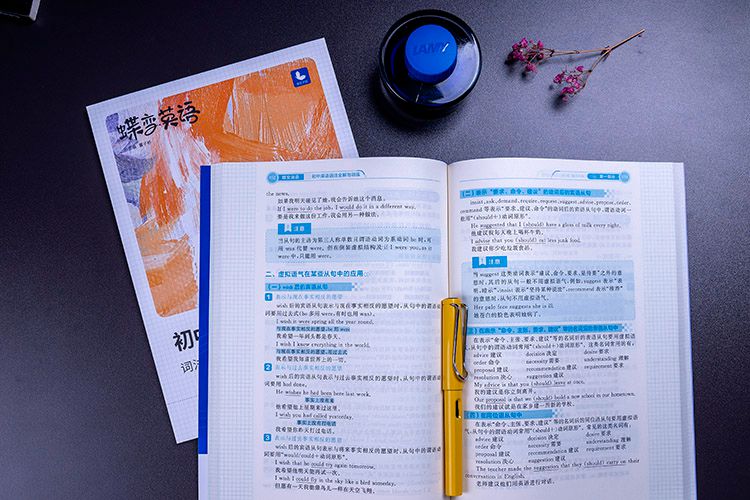专为高中生提供有价值的资讯
八大时态:1. 一般现在时;2.一般过去时;3.现在进行时;4.过去进行时;5.现在完成时;6.过去完成时;7.一般将来时;8. 过去将来时。接下来将总结八大时态的结构及用法,供大家参考。

1、一般现在时:动词+原形
2、一般过去时:was/were;动词变过去式
3、现在进行时:am/is/are+doing
4、过去进行时:was/were+doing
5、现在完成时:have/has+done
6、过去完成时:had+done
7、一般将来时:am/is/are/going to+do;will/shall+do.
8、过去将来时:was/were/going to+do;would/should+do.
一、 一般现在时:
1.概念:经常、反复发生的动作或行为及现在的某种状况。
2.时间状语:always, usually, often, sometimes, every week (day, year, month...), once a week, on Sundays,
3.基本结构:动词 原形 (如主语为第三人称单数,动词上要加(e)S)
4.否定形式:am/is/are+not;此时态的谓语动词若为行为动词,则在其前加don't,如主语为第三人称单数,则用doesn't,通常还原行为动词。
5.一般疑问句:把be动词放于句首;用助动词do提问,如主语为第三人称单数,则用does,同时,还原行为动词。
6.例句:It seldom snows here.
He is always ready to help others.
Action speaks louder than words.
二、 一般过去时:
1.概念:过去某个时间里发生的动作或状态;过去习惯性、经常性的动作、行为。
2.时间状语:ago, yesterday, the day before yesterday, last week(year, night, month…), in 1989, just now, at the age of 5, one day, long long ago, once upon a time, etc.
3.基本结构:be动词;行为动词
4.否定形式:was/were+not;在行为动词前加didn't,同时还原行为动词。
5.一般疑问句:was或were放于句首;用助动词do的过去式did 提问,同时还原行为动词。
6.例句:She often came to help us in those days.
I 三、 现在进行时:
1.概念:表示现阶段或说话时正在进行的动作及行为。
2.时间状语:now, at this time, these days, etc.
3.基本结构:am/is/are+doing
4.否定形式:am/is/are+not+doing.
5.一般疑问句:把be动词放于句首。
6.例句:How are you feeling today?
He is doing well in his lessons.didn't know you were so busy.
四、 过去进行时:
1.概念:表示过去某段时间或某一时刻正在发生或进行的行为或动作。
2.时间状语:at this time yesterday, at that time或以when引导的谓语动词是一般过去时的时间状语等。
3.基本结构:was/were+doing
4.否定形式:was/were + not + doing.
5.一般疑问句:把was或were放于句首。
6.例句:At that time she was working in a PLA unit.
When he came in, I was reading a newspaper.
五、 现在完成时:
1.概念:过去发生或已经完成的动作对现在造成的影响或结果,或从过去已经开始,持续到现在的动作或状态。
2.时间状语:recently, lately, since…for…,in the past few years, etc.
3.基本结构:have/has + done
4.否定形式:have/has + not +done.
5.一般疑问句:have或has提前
6.例句:I've written an article.
It has been raining these days.
六、 过去完成时:
1.概念:以过去某个时间为标准,在此以前发生的动作或行为,或在过去某动作之前完成的行为,即“过去的过去”。
2.时间状语:before, by the end of last year(term, month…),etc.
3.基本结构:had + done.
4.否定形式:had + not + done.
5.一般疑问句:had放于句首。
6.例句:As soon as we got to the station, the train had left.
By the end of last month. We had reviewed four books
七、 一般将来时:
1.概念:表示将要发生的动作或存在的状态及打算、计划或准备做某事。
2.时间状语:tomorrow, next day(week, month, year…),soon, in a few minutes, by…,the day after tomorrow, etc.
3.基本结构:am/is/are/going to + do;will/shall + do.
4.否定形式:was/were + not; 在行为动词前加won't,同时还原行为动词。
5.一般疑问句:be放于句首;will/shall提到句首。
6.例句:They are going to have a competition with us in studies.
It is going to rain.
八、 过去将来时:
1.概念:立足于过去某一时刻,从过去看将来,常用于宾语从句中。
2.时间状语:the next day(morning, year…),the following month(week…),etc.
3.基本结构:was/were/going to do;would/should + do.
4.否定形式:was/were/not + going to + do;would/should + not + do.
5.一般疑问句:was或were放于句首;would/should 提到句首。
6.例句:He said he would go to Beijing the next day.
I asked who was going there .
Copyright 2019-2029 http://www.laigaokao.com 【来高考】 皖ICP备19022700号-4
声明: 本站 所有软件和文章来自互联网 如有异议 请与本站联系 本站为非赢利性网站 不接受任何赞助和广告